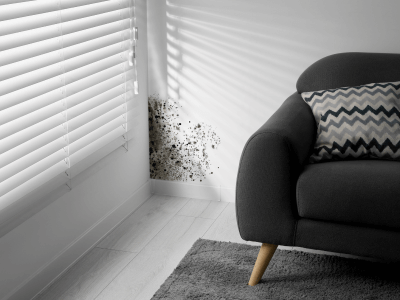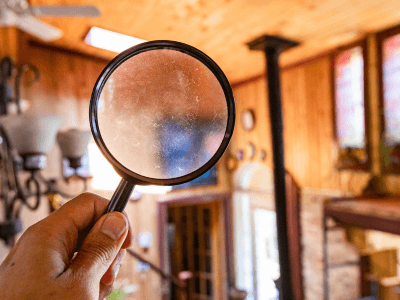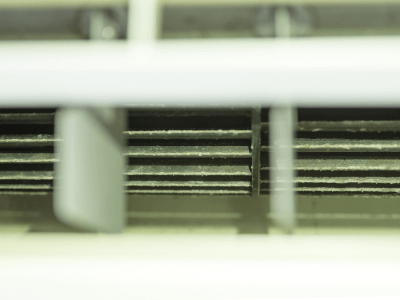

If you’ve noticed mold creeping into your home or just have a nagging concern about how it might be affecting your indoor air, let’s be clear: mold absolutely impacts your indoor air quality, and it’s not something to ignore. Whether it’s a faint musty smell or visible mold spots, these aren’t just minor annoyances—they’re warning signs.
You deserve to feel confident that your home is a healthy place for your family, and mold is a real threat to that. Understanding exactly how mold can undermine your air quality, and what you can do about it, is key to keeping your living space safe and comfortable. Let’s dive into what you need to know—and why dealing with mold right away is critical if you want to avoid costly damage and keep your home’s air safe for you and your family.
What is Mold, and How Does It Affect My Home?
Mold is a type of fungus that thrives in damp, humid environments. It spreads by producing tiny, lightweight spores that travel through the air. If these spores find a moist surface inside your home, they can begin to grow and reproduce. You’ll often find mold in places where moisture is common—like bathrooms, basements, kitchens, or anywhere there’s been a water leak or flooding.
Now, here’s the important part: those tiny spores can affect the air you breathe.
How Does Mold Impact Indoor Air Quality?
When mold is present indoors, it releases spores into the air. Even if the mold is hidden behind walls or under floors, the spores can still circulate throughout your home via air currents or your HVAC system. Once airborne, these spores can cause a variety of problems. Read more from the World Health Org about dampness and mould.
For most people, mold exposure leads to mild irritation, like coughing or sneezing. However, if you’re sensitive to mold, have asthma, or other respiratory issues, mold can trigger more serious symptoms, including wheezing, shortness of breath, or even respiratory infections in severe cases.
What Are the Signs That Mold is Affecting My Indoor Air Quality?
If you’re concerned about mold, you’re probably wondering how to tell if it’s already affecting your home’s air quality. Here are some common signs to watch for:
- Musty odors: A persistent, damp smell in certain areas of your home could indicate mold growth, even if you don’t see it.
- Allergy-like symptoms: Frequent sneezing, coughing, or itchy eyes when you’re indoors may be caused by mold spores in the air.
- Visible mold: If you see mold on walls, ceilings, or other surfaces, it’s likely that spores are also in the air.
- Increased humidity: Mold thrives in moist environments, so if your home feels unusually humid, it’s worth checking for mold growth.
Read more: Red Flags for Mold: What a Musty Smell in Your San Antonio Home Could Mean
Where Does Mold Typically Grow Indoors?
Mold spores need three things to grow: moisture, warmth, and a food source (organic material, like wood, drywall, or fabric). Here are the most common places mold tends to grow in homes:
- Bathrooms: The combination of steam from showers and poor ventilation creates the perfect environment for mold.
- Basements: Basements are often damp and prone to water leaks or high humidity, making them prime real estate for mold.
- Kitchens: Leaky sinks or dishwashers can lead to mold growth in cabinets, behind appliances, or in pantry areas.
- Attics: Poor ventilation and roof leaks can lead to mold growth in your attic, especially in a climate like San Antonio’s, where heat and humidity are common.
Can Mold Affect My Health?

The health effects of mold depend on the type of mold and your level of exposure. For most people, mild symptoms like sneezing, runny nose, or throat irritation are common. However, individuals with asthma, allergies, or weakened immune systems may experience more severe reactions.
It’s also worth noting that some molds produce mycotoxins, which are toxic compounds that can cause more serious health problems. Black mold (Stachybotrys), for example, is known for producing mycotoxins that may lead to respiratory issues, fatigue, and even memory problems.
If you or someone in your home has been experiencing unexplained health issues, it’s a good idea to investigate whether mold might be the culprit.
How Can I Improve Indoor Air Quality If I Have Mold?
If you suspect mold is affecting your indoor air quality, taking action quickly is key. Here’s what you can do:

- Control moisture: Mold cannot grow without moisture, so fixing leaks and controlling humidity is essential. Aim to keep indoor humidity levels below 50%, especially in humid areas like San Antonio.
- Ventilate properly: Use exhaust fans in bathrooms and kitchens, and ensure proper airflow throughout your home to prevent moisture buildup.
- Use air purifiers: HEPA air purifiers can help reduce airborne mold spores, improving the air quality while you address the root problem.
- Remove mold safely: Small mold problems can often be handled with DIY cleaning solutions, but for larger infestations, it’s best to call in a professional mold remediation service.
When Should I Call a Professional?
If you’ve found mold growing in multiple areas of your home, or if the problem seems to keep coming back despite your efforts to clean it, it’s time to call in a professional. Mold remediation experts can help:
- Identify the source of moisture that’s causing the mold problem.
- Safely remove the mold without spreading spores throughout your home.
- Prevent future mold growth by recommending ventilation or humidity control solutions.
In a city like San Antonio, where humidity and rainstorms are common, professional mold remediation can give you peace of mind that your home is mold-free and your air quality is protected.
What Can I Do to Prevent Mold in the Future?
Prevention is the best defense against mold. Here are some proactive steps you can take to reduce the risk of mold spores affecting your indoor air quality:
- Fix leaks promptly: Whether it’s a leaky roof or a dripping faucet, address water issues immediately to prevent moisture buildup.
- Use dehumidifiers: If you live in a humid area (like San Antonio), a dehumidifier can help keep your home’s humidity levels in check, especially in basements and attics.
- Clean regularly: Regularly cleaning areas prone to moisture, like bathrooms and kitchens, can help prevent mold from growing.
- Check ventilation: Ensure that exhaust fans are venting outside, not just recirculating air indoors. This is especially important in bathrooms and kitchens.
Final Thoughts: Does Mold Affect Indoor Air Quality?
Yes, mold can absolutely affect your indoor air quality. From mild allergic reactions to more serious health risks, mold spores can lead to discomfort and even long-term health issues. If you’ve noticed a musty smell or other signs of mold in your home, addressing it sooner rather than later can protect both your health and your property. Taking simple steps to control moisture, improve ventilation, and address mold issues quickly will go a long way in maintaining a healthy indoor environment.
If you ever feel uncertain about handling mold on your own, don’t hesitate to reach out to a mold remediation professional to ensure your home stays mold-free and your air quality stays fresh.
Keep Reading: Don’t Let Mold Take Over: How to Master Mold Prevention After Water Damage
